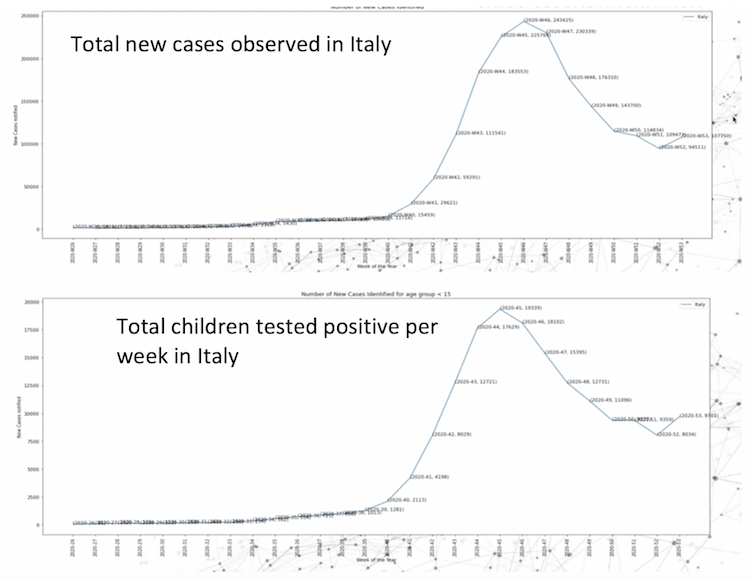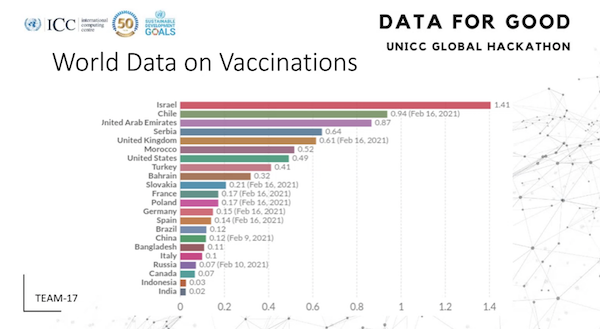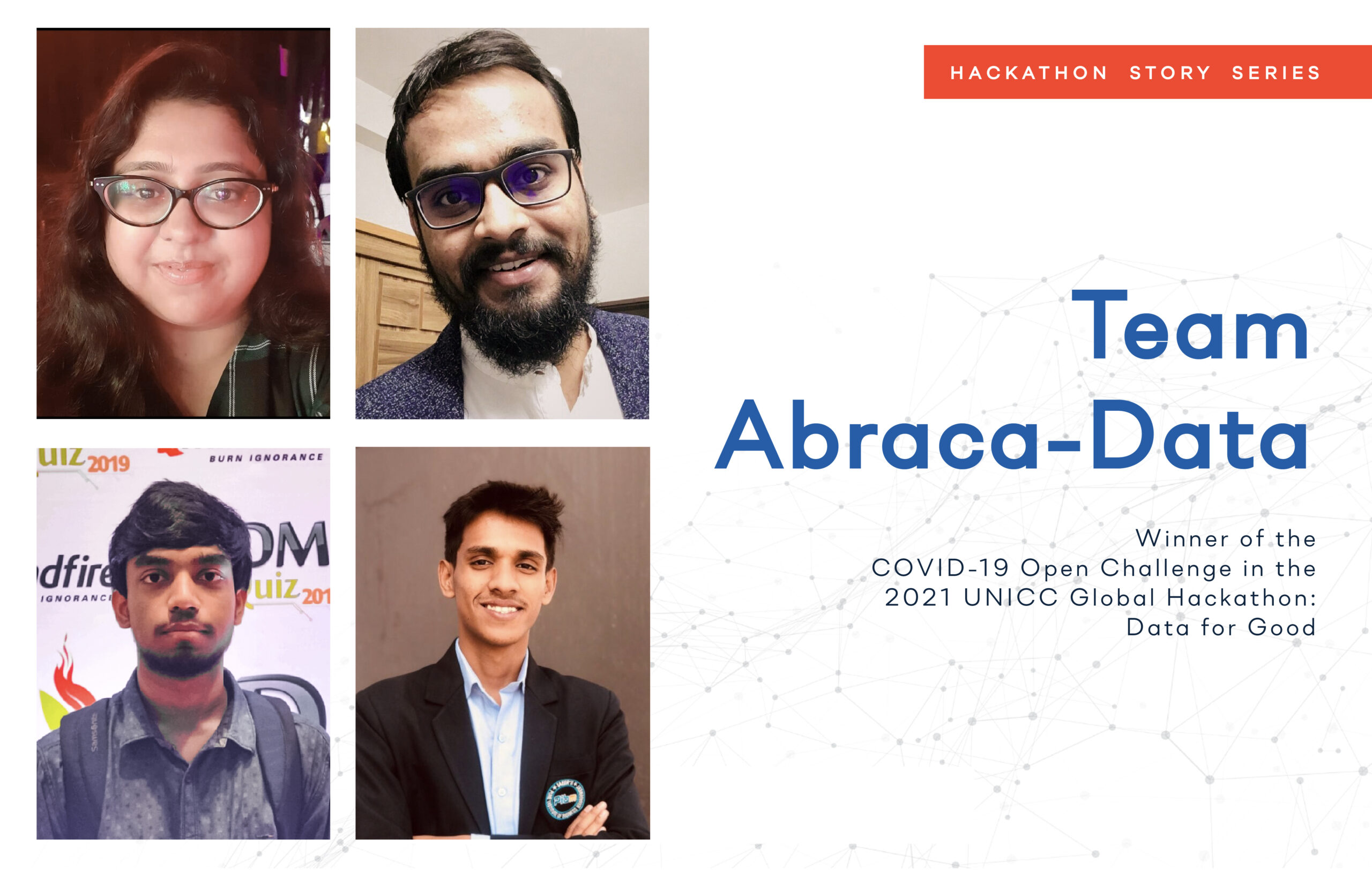Several days before the start of the UNICC Global Hackathon: Data for Good, five students from five different universities in India received an email from UNICC informing them they would be participating in the hackathon together as a team. Himanshu Bajpai, Birla Institute of Technology and Science in Pilani; Aanisha Bhattacharyya, Institute of Engineering and Management in Kolkata; Foridur Rahman, Savitribai Phule Pune University in Pune; Swaraj Priyadarshan Dash, Silicon Institute of Technology in Bhubaneswar all registered individually without knowing each other or what to expect.
Our team consisted of students from India with an enthusiasm for data science… Our participation as a team was entirely a stroke of luck.
Himanshu Bajpai, Birla Institute of Technology and Science, Pilani, India
UNICC’s Global Hackathon: Data for Good launched on Tuesday, 16 February 2021 with an introduction from the organization’s executive leadership to a global audience of UNICC and other UN organizations’ staff members, university representatives and over 140 students. Following the introductory remarks from UNICC’s Director Sameer Chauhan and Chief of Digital Business Solutions Ninna Roco, Anusha Dandapani, Chief of Data Analytics, introduced the three challenges of the hackathon: COVID-19 Open Challenge, Refugee Crisis: Predict Forced Displacement, and the UN75 Visualization Challenge.
Himanshu, Aanisha, Foridur and Swaraj registered under the name Team Abraca-Data and opted for the Covid-19 Open Challenge. The challenge called for measuring the socioeconomic impact of the pandemic, identifying key stakeholders in managing the outbreak and forecasting the impact of phased vaccination cycles.
The team began by breaking apart the segments of the challenge and delegating the analytic workstreams to members of the team: Swaraj focused on government measures implemented in developing countries, Aanisha investigated the global vaccination drive, Foridur observed the socio-economic impact of Covid-19 and Himanshu found trends in overall transmission of the virus. All of the students brought their individual fortes in data analysis, statistics and interpretation to approach their respective areas of research.
Despite their varying approaches, all students on the team collectively agreed upon one thing: to look for trends not already known. Instead, the students focused on finding new insights, particularly how the Covid-19 virus is transmitted among children, the resulting behavioral changes in societies and patterns in the vaccination drive with other key international factors. They looked into data sets from the European Centre for Disease Prevention and Control, Johns Hopkins University, New York Times, The Covid Tracking Project, and UN data sets such as OCHA Coronavirus (Covid-19) Vaccinations, all of them open source.
They found that the number of children testing positive was actually in regard to the number of cases identified as positive in Italy. The team presented that on average, 1/12 of all positive Covid-19 cases in Italy were children less than 15 years old, effectively marking a correlation between the number of cases among children and the general population that has the potential to guide future policy decisions in the pandemic.


Additionally, the team presented a word cloud visualisation that was built from various data sets, including the ACAPS COVID-19 Government Measures Dataset which consists of related intel across sources from governments, media, the United Nations and other organisations. By building this visualisation, team members offered insight on shifts in public opinion through the observation of common verbiage, such as “Violence” and “Alcohol” pertaining to individual behavior and “Sanitation” and “Unemployment” related to government response.
One thing that we were clear about though, was that we won’t try to find trends and patterns that we were already aware of. Instead, we’d try to discover new insights.
Team Abraca-Data
The final section of their presentation focused on the global vaccination drive, where they started by looking for correlations between countries that are leading the vaccination drive, such as Israel, Chile, United Kingdom and Serbia, and their ranking in GDP per capita. They also focused on other trends such as data concerning the overall rate of vaccination and the return rate for the second dose for Moderna and Pfizer/BioNTech vaccines.
The team’s meticulous research and valuable data insights won them first place in the UNICC Global Hackathon Challenge 1: Covid-19 Open Challenge, where they were competing against four other teams. Furthermore, their award-winning project allowed for the development of their data skills capabilities and provided data-driven insights, addressing two of UNICC’s data strategy goals in alignment with the UN Secretary-General Data Strategy.
When recounting their Hackathon experience, Abraca-data members expressed an overwhelming appreciation and an enriching experience. They thanked their mentors, whose dedicated attention and helpful feedback “only motivated us to push harder.”
Team members aim to continue their collaboration and build upon their research, such as incorporating more data on vaccinations, for future presentations and publication.
This article is part of a series of stories from the first UNICC Global Hackathon: Data for Good that took place in February 2021. The hackathon drew registrations from a total of 140 students from 54 universities located in 13 countries around the globe, all of whom came together to tackle three major UN related challenges: Covid-19 Open Challenge, Refugee Crisis: Predict Forced Displacement, and the UN75 Visualization Challenge. To learn more about this successful event and its wonderful finalists, please refer to this article here.

